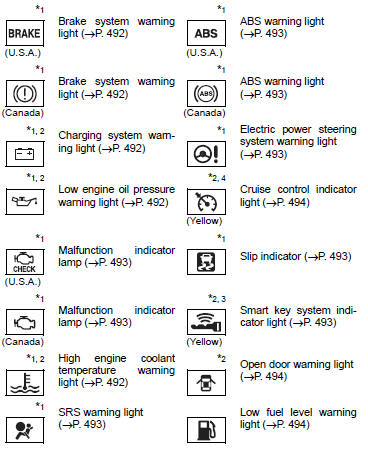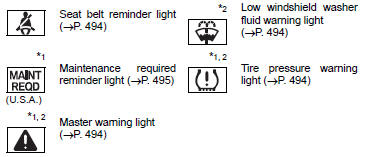Toyota Corolla (E170) 2014–2019 Owners Manual / Instrument cluster / Warning lights and indicators / Warning lights
Toyota Corolla (E170): Warning lights
Warning lights inform the driver of malfunctions in the indicated vehicle’s systems.


*1: Vehicles without a smart key system: These lights turn on when the engine switch is turned to the “ON” position to indicate that a system check is being performed. They will turn off after the engine is started, or after a few seconds. There may be a malfunction in a system if a light does not come on, or if the lights do not turn off. Have the vehicle inspected by your Toyota dealer.
Vehicles with a smart key system: These lights turn on when the engine switch is turned to IGNITION ON mode to indicate that a system check is being performed. They will turn off after the engine is started, or after a few seconds. There may be a malfunction in a system if a light does not come on, or if the lights do not turn off. Have the vehicle inspected by your Toyota dealer.
*2: If equipped
*3: The light flashes in yellow to indicate a malfunction. The light flashes quickly
in green to indicate that the steering lock has not been released.
*4: The light comes on in yellow to indicate a malfunction.
Other materials:
Bluetooth® Audio (Multimedia system)
Listening to Bluetooth® Audio
The Bluetooth® audio system enables the user to enjoy music played on a portable
player from the vehicle speakers via wireless communication.
When a Bluetooth® device cannot be connected, check the connection status on
the “Bluetooth* Audio” screen. If the ...
Diagnostic trouble code chart
The inspection procedures are shown in the table below. This table allows
efficient and accurate troubleshooting
using the diagnostic trouble codes displayed in the diagnostic trouble code
chart. Proceed with
troubleshooting in accordance with the inspection procedures listed in the
diagnost ...
Inspection procedure
Hint:
start the inspection from step 1 in case of using the hand–held tester and start
from step 2 in case of not
using the hand–held tester.
1 Perform active test by hand–held tester(abs motor relay)
Check the operation sound of the abs motor individually when operaing it
with the ...


